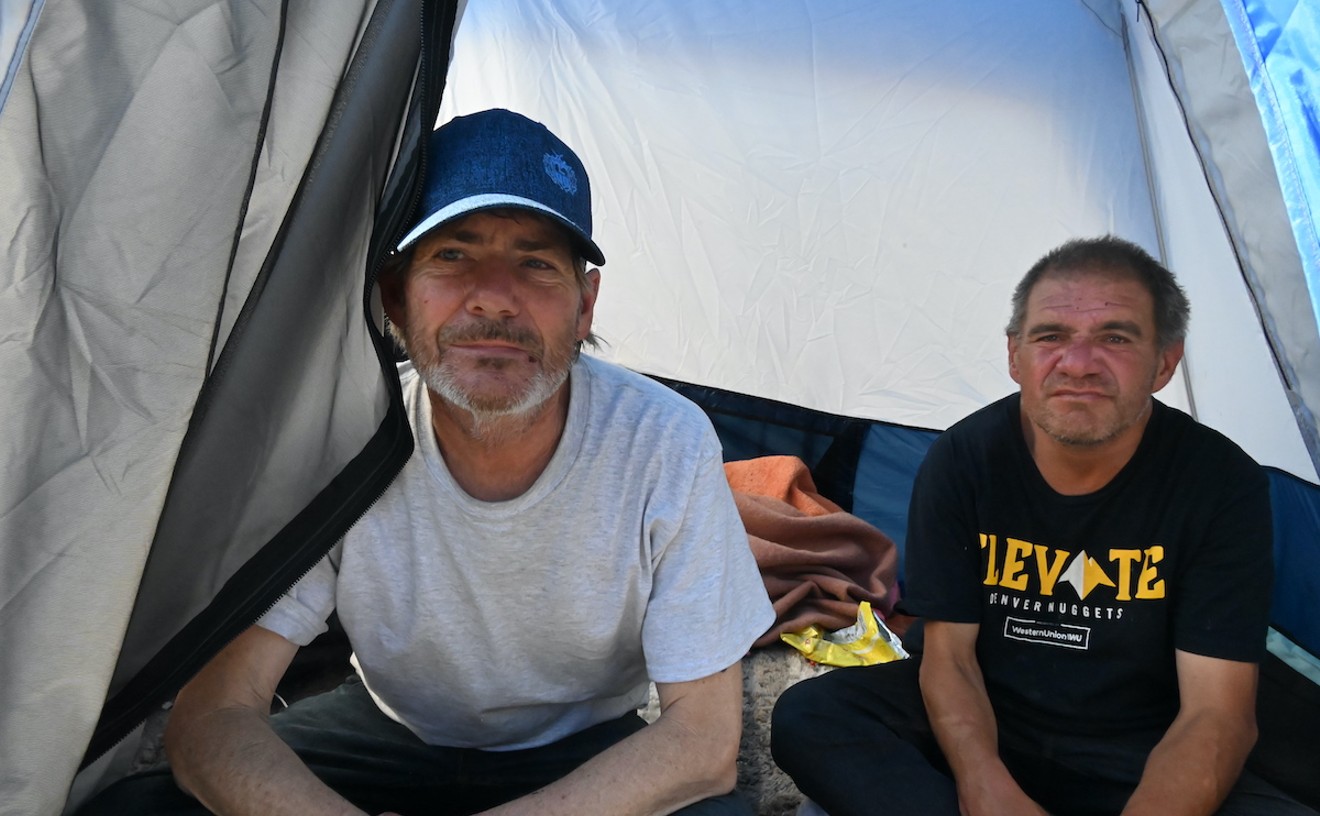Ever since the March 8 and 9 sweeps of homeless encampments near the Denver Rescue Mission, the city has engaged in a sustained crackdown on uprooted and displaced individuals throughout the city. These actions have been documented by “camping ban” statistics kept by the Denver Police Department, as well as by anecdotal evidence, such as information provided by eyewitnesses of a large-scale operation along the Platte River on July 13.
Even before the current wave of sweeps began, however, the city faced criticism for its treatment of homeless people's property. In December 2015, dozens of individuals claimed to have had their belongings thrown into a Department of Public Works dump truck with no prior warning. And as recently as the July 13 sweep along the Platte, there were reports that tents, cooking equipment and other personal items belonging to homeless people were trashed by the city without any means to retrieve them.
Such reports have led a local civil-rights lawyer to prepare a class-action lawsuit against the city.
On Thursday at 4 p.m., attorney Jason Flores-Williams is holding a meeting at the central branch of the Denver Public Library for individuals interested in participating in the suit.
"We're looking for representative plaintiffs,” explains Flores-Williams. "We need to have four or five representatives of the class who can adhere to a meeting schedule and who we can bring into court to testify in a class certification hearing. They will represent the other thousands of individuals who have been deprived of their constitutional rights and who also happen to be homeless."
In particular, Flores-Williams believes that Denver has been violating equal protection, property and due-process rights of the city's homeless population.
"Like an authoritarian state, Denver has decided to deprive homeless people of their property without any due process, and that violates their constitutional rights," he says, pointing to the U.S. Constitution's Fourth Amendment protections against unlawful searches and seizures. The lawyer additionally cites violations of the Fourteenth Amendment’s guarantee of equal protection under law and the First Amendment's guarantees of speech and assembly (one could argue that encampments are a form of expression or protest).
Flores-Williams tells Westword that some of his motivation to get involved is personal. “I grew up with a father in prison, and so I was homeless for a bit. So I know some of the suffering that's involved here."
But the lawyer also has experience in the field of assets forfeiture law. “We've won several landmark cases dealing with the violation of due-process rights when it comes to white-collar criminal defendants and corporations,” he explains. "There's a lot of fantastic law that has been issued recently safeguarding the property of corporations (that are treated as persons), and so we want to apply that to homeless persons."
Flores-Williams also highlights an important precedent: Fresno.
In 2008, the city of Fresno, California, settled a class-action suit that involved hundreds of homeless individuals who claimed to have had their belongings destroyed in sweeps. After their class-certified suit w,as filed in 2006 by a team of lawyers, including ACLU of Northern California members, Fresno and the California Department of Transportation agreed to pay out $2.35 million to individual plaintiffs and create a fund that provided housing and medical care to that city's homeless.
Flores-Williams says that such litigation is also possible in Denver using “42 U.S. Code 1983,” which allows for suits to be filed in federal court against a city for violating citizens' constitutional rights.
The code also allows for monetary damages, which, if awarded, would compensate his firm with up to 30 percent of the total reward. But Flores-Williams says the suit isn't about the money.
"If the city were to come back and say, 'We just want to fix the problem,' then we will be doing this pro bono, because that's what we want: to fix the problem,” he says.
This will include a letter that his firm will send to the city 72 hours before filing a suit, "to give [Denver] the opportunity to avoid ligation.
“If they respond in good faith, then we will hold on to the injunction lawsuit and attempt to work with them,” Flores-Williams says. Otherwise, the firm will go forward with its filings for class certification, injunction and damages – a process that could take many months.
Ultimately, though, the lawyer says that he wants to see justice for Denver's homeless population.
“This is exactly the kind of the group that a class action is designed for” he says. “It's a group of people who have a commonality of issues and whose rights are being violated, but who the courts would have a difficult time recognizing on an individual level.”
[
{
"name": "Air - MediumRectangle - Inline Content - Mobile Display Size",
"component": "12017618",
"insertPoint": "2",
"requiredCountToDisplay": "2"
},{
"name": "Editor Picks",
"component": "17242653",
"insertPoint": "4",
"requiredCountToDisplay": "1"
},{
"name": "Inline Links",
"component": "18838239",
"insertPoint": "8th",
"startingPoint": 8,
"requiredCountToDisplay": "7",
"maxInsertions": 25
},{
"name": "Air - MediumRectangle - Combo - Inline Content",
"component": "17261320",
"insertPoint": "8th",
"startingPoint": 8,
"requiredCountToDisplay": "7",
"maxInsertions": 25
},{
"name": "Inline Links",
"component": "18838239",
"insertPoint": "8th",
"startingPoint": 12,
"requiredCountToDisplay": "11",
"maxInsertions": 25
},{
"name": "Air - Leaderboard Tower - Combo - Inline Content",
"component": "17261321",
"insertPoint": "8th",
"startingPoint": 12,
"requiredCountToDisplay": "11",
"maxInsertions": 25
}
]











